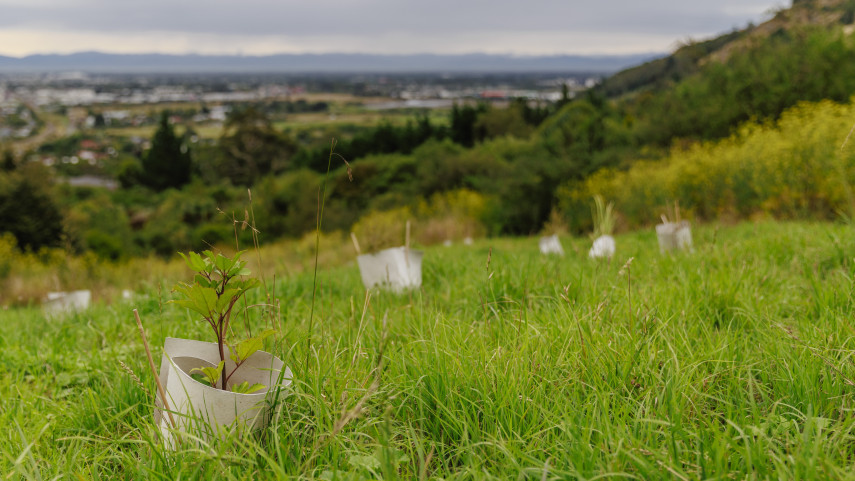Adopted by the Council 6 November 2014.
Vision
Christchurch is the best edible garden city in the world.
Objective
A food-resilient Christchurch with thriving social, economic and physical environments providing healthy, affordable and locally grown food for all people.
What is food resilience?

Physical and economic access, by all people, at all times, to enough food to maintain an active and healthy life.
This exists when everyone can access a reliable supply of healthy food which is nutritious, affordable, safe and culturally appropriate, and that is able to sustain a person’s physical, mental and cultural wellbeing.
A local food production and distribution system based on ecological sustainability, able to withstand natural and man-made shocks is a vital part of food resilience (based on a World Health Organisation, 1996 World Food Summit definition of food security).
Food Resilience Policy Outcomes
1. Health and well-being
People can more easily access low-cost, healthy, fresh fruit and vegetables, and have more active lifestyles through gardening activities. Mental and physical health is enriched by healthy eating, but also through strong personal relationships and experiences enjoyed in community gardens and through community collaboration. The sharing of surplus food supports low-income households, food banks and community kitchens.
2. Close-knit and self-reliant communities
Enjoying, growing and sharing food brings neighbours and communities together. Community gardens are community hubs, which empower residents to solve local problems in many creative ways. Crime is reduced because the city’s green spaces are activated and cared for by more connected self-reliant communities. Volunteering is encouraged and rewarded often with free food.
3. Lifelong learning
Practical knowledge of how to grow, harvest, prepare and enjoy locally grown food is shared among the community. School gardens enable children to learn where their food comes from and the natural cycles of life. At community gardens, people learn how to grow food and compost at home, but also about traditional/cultural uses for plants, medicinal uses, weaving, art and a wide variety of recipes and cooking methods helps add delight and diversity to city life.
4. Thriving local food economy
New business opportunities and jobs are created by the community supporting their locally grown food economy. Pathways that lead to both paid and voluntary work are explored and encouraged. Entrepreneurs foster new business models such as local food co-operatives, boxed food delivery, farmers markets, and grower incubators and syndicates. Knowledge of how to sustain a diverse and resilient local food economy can be shared with other communities as part of a green knowledge economy.
5. Resilient and sustainable food system
A more diverse and localised food production and distribution system builds resilience and enables more sustainable production and distribution methods that reduce the environmental footprint of food.
6. Stewardship of public spaces
People are encouraged to care for edible plants and community gardens on suitable green spaces. This helps to maximise community value and enjoyment from these spaces, manage anti-social behaviour, but can also lower maintenance costs for the Council. Community gardens and allotments become useful responses for keen gardeners living in a denser city.
7. Celebrating our garden city heritage
Our natural and cultural garden city heritage is celebrated and physically demonstrated throughout the city. Weaving edible gardens into public and private spaces will offer a wider range of recreational opportunities and amenities, enriching the liveability and enjoyment of our city.
8. Growing a beautiful and bio-diverse garden city
Edible gardens enrich city life supporting bees, birds, butterflies and biodiversity. In many cases, seedlings can be grown by communities to complement existing native and exotic planting throughout the city. Productive gardens will become an essential part of the city’s green infrastructure.
Priorities to achieve the vision
The Council will:
- Collaborate with the community to achieve the food resilience vision, objective and outcomes, for example by being a participant in the creation and implementation of a Food Resilience Action Plan for the city and by being an active member of the Food Resilience Network.
- Identify and make available suitable Council land for food production, community gardens and related activities, and establish supportive frameworks that enable community use of these spaces.
- Encourage the establishment of productive gardens on suitable land around the city that is not in Council ownership, for example, homes, schools, church land, institutions and market gardens.
- Protect locally productive soils surrounding the city from inappropriate development that undermines the lands productive capacity.
- Commit to increasing the nutritional quality of food in Council facilities, events and food stalls on public land (for example ensure that low sugar, fat and salt options are provided).
- Advocate on behalf of the community on issues that affect the city’s food resilience, for example, advocacy to the central government about healthy food choices in schools.
- Support initiatives that increase the availability, distribution and affordability of fresh, healthy food in our communities, for example, farmers markets, greengrocers, local food cooperatives and community kitchens.
- Work with food producers, distributors, retailers, other agencies and the community to encourage the availability, affordability and uptake of healthy food in our community.
- Support community education through community gardens and other local initiatives that increase knowledge of how to grow, harvest, prepare and consume healthy locally grown food to support edible gardens and a thriving local food economy.
- Support competitions, awards or harvest festivals that celebrate our garden city identity, encourage edible gardens, and community gardens, and educate the community about the benefits of our food-resilient edible garden city.
Strategic alignment
- Strengthening Communities Together Strategy
- Climate Resilience Strategy
- Open Space Strategy
- Sustainability Policy
- Healthy Christchurch Charter and Partnership
- Share an idea outcomes
Related news

Restoration of red-zoned Port Hills properties gets underway
A 10-year programme to revegetate red-zoned properties in the Port Hills aims to transform the area and restore its unique biodiversity.
11 Feb 2026
Fund open to support sustainable community initiatives
The Sustainability Fund is open now for applications for projects that help meet the Christchurch City Council’s climate change objective and targets.
1 Dec 2025
Upskill on climate change with UC – for free
Ōtautahi Christchurch residents will soon have free access to a new online learning course designed to build understanding and resilience in the face of climate change.
14 Oct 2025